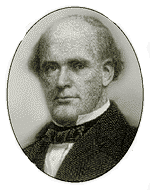< Previous Chapter * Next Chapter >
*** Quote ***
Fourth Circuit Court of Virginia was the jurisdiction
Andrew Johnson wanted for the treason trial of Confederate President
![]() Jefferson
Davis.
Jefferson
Davis.
Military officials wanted to try him in their courts. The authorities debated over the jurisdiction for two years while Davis was imprisoned. Johnson knew a military trial would make Davis a martyr. Chase refused to hear cases in the Virginia Circuit while the State was still under the military government and not until the writ of habeas corpus was restored. When Chase finally sat at the Davis trial in November 1868 he approved Davis' lawyer's argument that the 14th Amendment that had recently gone into effect applied to Davis. In December Johnson issued a general amnesty. At the next session of circuit court, Chase discharged Davis on the grounds he was included in the pardon and could not be tried ex post facto.[20]

It was thought by the opponents of Johnson that the Chief Justice believed impeachment to be unwise, and his rulings on the admissibility of evidence and on procedural questions often helped the defense. One vote saved Andrew Johnson from being impeached.21 The day of the verdict May 16, Chase had his doubts that Johnson would be acquitted and had made up a presidential oath in which he included the verb "act" which he was prepared to administer to his 'hated enemy', president pro tempore of the Senate, Benjamin Wade. Wade could act as president only until March 4 when as new administration would take office.[22]
Chase lead the fight to have the Legal Tender Act declared unconstitutional. In 1870 Chase, had written the opinion of the Court in Hepburn V. Griswold, which divided, 53, in finding the act unconstitutional. Reversing it's decision in Hepburn V. Griswold with Knox V. Lee and Parker V. Davis, 1871, by a 5-4 decision with a President Ulysses S. Grant 'packed' court, the Court declared the Legal Tender Acts constitutional. That Congress had used it's implied powers properly when it made paper currency legal tender for the payment of debts.[23]
Salmon Chase suffered a paralyzing stroke in the summer of 1870 that left him off the bench for a year. He recovered sufficiently to return to preside over his Court for the 1871-1872,1872-1873 terms. If the retirement hadn't been seventy years old, he would have retired.
In the last two cases before Chase's death, the court would deal for the first time with the scope of the 14th Amendment. Chase dissented with the Court's decision in both actions. With a 5-4 decision in the Slaughterhouse case, the Court held that Louisiana had not violated the 14th Amendment by granting a monopoly to one slaughterhouse. Chase was the lone dissenter in Bradwell V. Illinois when the court ruled that a woman denied the right to practice law in the state courts because of her sex was not denied the privileges or immunities of U.S. citizenship. [24] Unfortunely the Chief Justice was too ill to make any written dissent. Mrs. Bradwell and her husband Judge James Bradwell in 1876 would be involved in securing Mary Todd Lincoln's release from the Bellevue Place sanitarium where her son Robert and Supreme Court Justice David Davis had had the president's widow committed to.[25]
< Previous Chapter * Next Chapter >